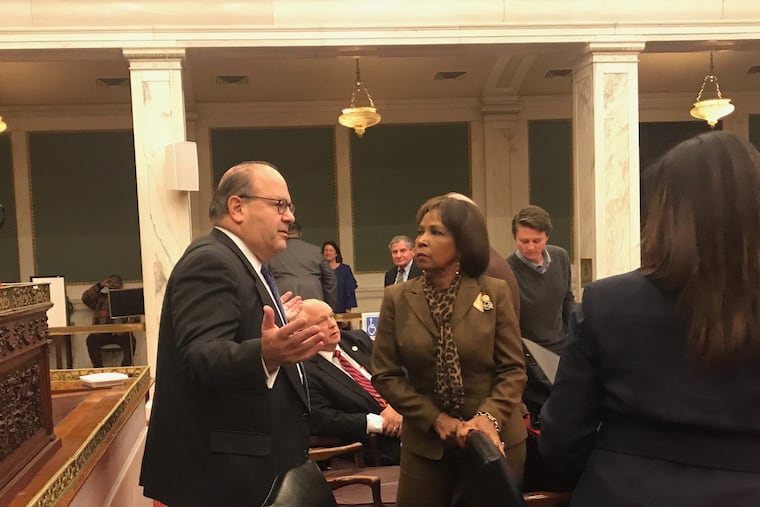Who’s your rent money going to? Philly bill would unmask LLCs.
The bill would require property owners with at least 24 percent share in a property to provide their names and mailing address when applying for a residential or commercial rental license.

Rose Correa thought she knew the name of her landlord: ABC Capital. A representative from ABC Capital took her on a walk-through of the North Philadelphia apartment, and her checks were all made out to ABC Capital. So when notices from the Water Department arrived, addressed to SAAT Investments, she assumed it was a mistake.
That is until her water was shut off. The previous tenant owed thousands of dollars she was being billed for.
It turned out SAAT Investments is a limited liability corporation set up by ABC Capital, which manages more than 1,000 apartments around the city.
"It was crazy," Correa said. "I'd never heard of them before, and they're getting my money, and no one is keeping their promises" to fix things.
LLC-owned rentals are perfectly legal and growing nationwide. But a bill being considered in Philadelphia City Council would require the people behind those corporations to disclose their identities. If passed, the legislation could make it easier for Philadelphia to track down negligent landlords, as well as provide an overall sense of who is buying property.
Critics say the measure could dissuade development, run up against privacy laws, and put property owners in a dangerous position should an unhappy tenant want to retaliate.
The bill, introduced by Councilwoman Blondell Reynolds Brown, would require property owners with at least a 24 percent share in a property to provide their names and mailing addresses when applying for a residential or commercial rental license. If no owner has that big a share, then the four owners with the highest stakes would need to be named.
"The result of these hidden identities means the city cannot adequately fix blight," Brown said at a Council hearing Wednesday. "We as leaders are unable to answer basic questions about our own housing market."
In Correa's case, she, her boyfriend, and their 16-month-old son had to move to an apartment in Southwest Philadelphia last year after complaints about water leaking through the roof, a broken door, and a sewage explosion at the apartment in North Philadelphia.
"There was no way for my clients to contact the actual owners of the homes," said George Donnelly, an attorney with the Public Interest Law Center who is representing Correa in a lawsuit against ABC Capital.
He said the bill would give a clearer picture of the real estate landscape. "I think the people of Philadelphia have a right to know who's buying up houses in the city and where those folks are from. … If you are confident enough in Philadelphia to do business here, you should be proud enough of your business practices to put your name on it."
ABC did not return requests for comment. The company's website says it manages more than 1,300 properties in the city and was the largest Philadelphia cash buyer in 2015.
LLCs are used widely in real estate to spread the financial burden of a development among multiple buyers without putting any one at risk. For a fee, ABC Capital sets up the LLCs, allowing home buyers to remain anonymous and collect rent without having to manage the properties.
Victor Pinckney, senior vice president of HAPCO, the Homeowners Association of Philadelphia, said the law would discourage property owners from providing needed housing. Pinckney said the bill unfairly targets property owners and puts landlords at risk of harm by jilted tenants.
"It's dangerous. We have sheriffs and police officers who do evictions for a reason," he said.
A similar bill was proposed in Washington, D.C., this summer.
At the national level, federal agencies like the IRS have pushed for more transparent owner disclosure for years to go after criminal offenses such as money laundering or tax evasion, said Lisa R. Jacobs, a partner at the DLAPiper law firm.
Brown's bill is part of a package intended to protect children from lead paint, which is most often found in rental properties. To enforce those laws, the city needs to know how to find property owners, Brown said.
At Wednesday's hearing, the city's Department of Licenses and Inspections spoke in favor of the bill, saying it would cut down on the time its spends tracking down owners. Tenants-rights lawyers also spoke in favor of the bill.
The five-member committee considering the bill voted 4-1 to advance it to Council.
Councilman Allan Domb, who owns hundreds of properties around the city, voted against it. He didn't see his vote as a conflict of interest as a property owner.
"The property I own, the LLC has my name on it," Domb said. "It says ADR, Allan Domb Real Estate, and I manage it myself." Domb said he would support the bill if amended to require disclosure of one primary owner instead of all major owners. "There are many people who invest, whether it's real estate or other things, who wouldn't want to be in the public eye."